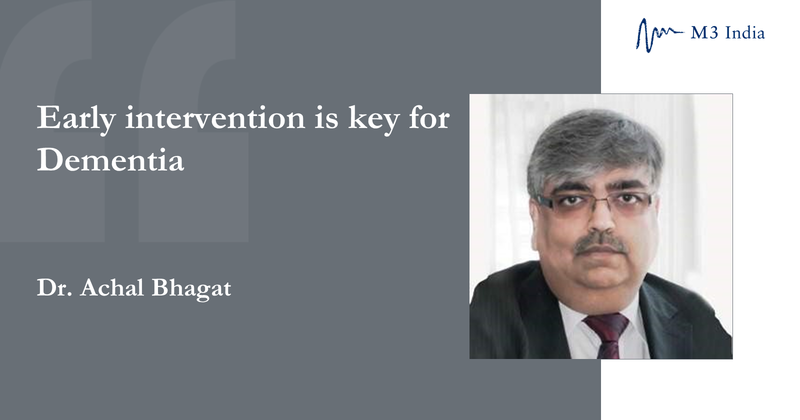Early intervention is key for Dementia: Dr. Achal Bhagat
M3 India Newsdesk Sep 21, 2018
In the next three decades, India may have one of largest population of people living with Dementia in the world.

This article is contributed by Dr. Achal Bhagat, Senior Consultant Psychiatrist and Psychotherapist, Apollo Hospitals, Delhi, Chairperson, Saarthak, Chairperson, AADI
Dementia- Why is there a need to act?
India has an aging population. Presently about 8.8 per cent Indians live beyond the age of sixty-five. This number is likely to increase over the next twenty years. As this number increases, the disorders of the brain like dementia are likely to be more prevalent in India. In the next three decades, India may have one of the largest population of people living with Dementia in the world.
Assuming average cost of caring for a person living with Dementia in India of approximately Rs. 44,000 per annum, the total cost per annum for India is estimated to be Rs. 15000 crores. Most of the cost of caring is borne by the primary care givers in face of a virtual lack of other support services. These estimates are conservative and are likely to be substantively higher than presently estimated. It is therefore becoming imperative for the health services to become ready for this demographic shift.
How can you help?
As a healthcare professional, you can help decrease the anguish related with Dementia.
- Early Diagnosis of Dementia: There is no single test which can confirm the diagnosis of Dementia. The process of diagnosis includes the following:
- Accurate History and examination of the person living with Dementia.
- Further clarification and validation by a primary caregiver or family member.
- Conducting Cognitive tests like MMSE and MOCA to screen for Dementia.
- Conducting blood tests for modifiable causes of Dementia, including but not limited to Thyroid Profile, Vitamin Assays, STI screening, HIV screening, Heavy Metal Screening and Renal and Hepatic Function.
- Imaging studies to rule out tumors and space occupying lesions and documenting the nature and extent of vascular and atrophic changes.
- Prevent Vascular dementia by advising lifestyle changes - what is good for the heart is good for the brain.
- Educate the family about the nature of the diagnosis, next steps and nature of services available.
- Early referral to a specialist like a Neurologist or a Psychiatrist.
- Start treatment with medicines like Donepezil and Memantine in consultation with the specialists.
- Follow up and maintain the person in community by becoming a hub of support services, such as recruitment and training of caregiving services; support and psycho-education groups for caregivers; and day care services for people living with Dementia.
Dementia is not aging. It is important to diagnose dementia early and intervene to modify its course. Early diagnosis means better quality of life for the person and caregivers for longer periods of time. However, in diagnosing early, the effort should be to acknowledge the people living with Dementia and their caregivers as people first.
Remember, if you do not help, the treatment and care gap for dementia will be unfathomable. If it was only a specialist’s job to care for dementia, most people would not be able to access care.
Click here to read Part 1, which discusses about Dementia and how best to identify Alzheimer's dementia.
This article was originally published on 21 September 2017.
Disclaimer- The views and opinions expressed in this article are those of the author's and do not necessarily reflect the official policy or position of M3 India.
This article is contributed by Dr. Achal Bhagat, Senior Consultant Psychiatrist and Psychotherapist, Apollo Hospitals, Delhi, Chairperson, Saarthak, Chairperson, AADI.
-
Exclusive Write-ups & Webinars by KOLs
-
Daily Quiz by specialty
-
Paid Market Research Surveys
-
Case discussions, News & Journals' summaries